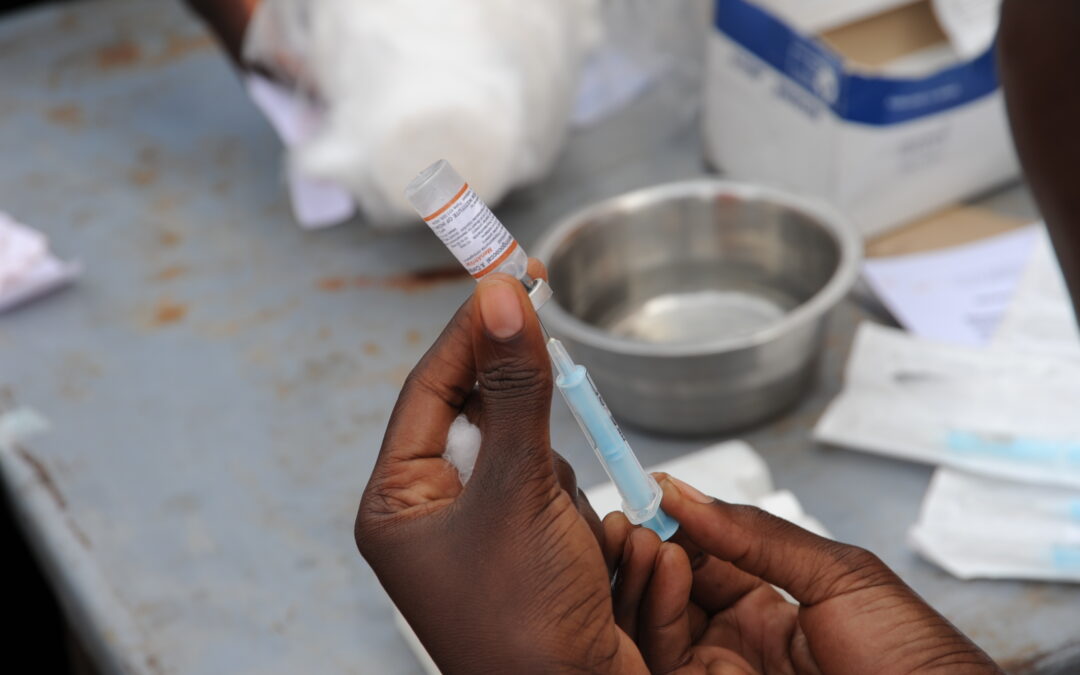
Mar 23, 2021 | Advocacy, News, Op-eds
[TOC]By Tim Fish Hodgson, Legal Adviser on Economic, Social and Cultural Rights at the International Commission of Jurists and Rossella De Falco, Programme Officer on the Right to Health at Global Initiative on Economic, Social and Cultural Rights.
Historically pandemics have often catalyzed significant social change. As historian of epidemics Frank Snowden puts it: “epidemics are a category of disease that seem to hold up the mirror to human beings as to who we really are”. At the moment gazing in that mirror remains a regrettably unpleasant experience.
United Nations human rights Treaty Body Mechanisms and Special Procedures, the World Health Organization (WHO), UNAIDS and numerous local, regional and international human rights organizations have produced reams of statements, resolutions and reports bemoaning the human right impacts of COVID-19 and almost every single aspect of the lives of almost all people around the world. The latest being the UN Human Rights Council Resolution adopted today by consensus on “Ensuring equitable, affordable, timely and universal access for all countries to vaccines in response to the coronavirus disease (COVID-19) pandemic”.
Key amongst the human rights law and standards underpinning these analyses is the protection of the right to the highest attainable standard of health, which, certainly for the 171 States Parties to the International Covenant on Economic, Social and Cultural Rights places an obligation on States to take all necessary measures to ensure “the prevention, treatment and control of epidemic, endemic, occupational and other diseases”, and, in the context of access to medicines the right to “enjoy the benefits of scientific progress and its applications”.
Despite these legal obligations, in late February, the UN Secretary General António Guterres felt compelled to highlight the rise of a “pandemic of human rights abuses in the wake of COVID-19”, including, but extending beyond violations of the right to health. The impact of COVID-19 on human rights has, and continues to be, sufficiently ubiquitous that an Indonesian transwoman activist Mama Yuli perhaps captured it best when telling a journalist that she and others in her position were “living like people who die slowly”.
Vaccines for the few, but what about the many?
Disappointingly, however, instead of a symbol of hope of a light at the end of the Coronavirus tunnel, the COVID-19 vaccine has fast become yet another pronounced illustration of the parallel pandemic of human rights abuses described by Guterres. The disastrous state of COVID-19 vaccine production and distribution throughout the world – and even within particular countries where vaccines are available – is now often described by many activists, including significantly the People’s Vaccine campaign, as “vaccine nationalism” and profiteering which has produced a “vaccine apartheid”.
What this means, in human rights language, is that States have often arranged their own affairs in a way that is detrimental to access to vaccines in other countries in spite of their extraterritorial legal obligations to, at very least, avoid their actions that would foreseeably result in the impairment of the human rights of people outside their own territories.
It is worth emphasizing that it has still been only some four months since the first mass vaccination campaigns began in December 2020. At the time of writing, approximately 450 million people had been vaccinated worldwide, while many African nations, for example, had yet to administer a single dose. While in North America 23 COVID-19 vaccine doses have been administered per 100 hundred people, with the number standing at 13/100 in Europe, the ratio decreases dramatically in the Global South with 6.4/100 in South America, 3.8/100 in Asia, 0.7/100 in Oceania and a mere 0.6/100 in Africa.
Vaccines, State Obligations and Corporate Responsibilities
The inadequate and inequitable distribution of vaccines has a variety of causes.
First, is the generally dysfunctional nature of the global health system due to what the UN Committee on Economic, Social and Cultural Rights described in its first statement on COVID-19 as early as April 2020 as “decades of underinvestment in public health services and other social programmes”. The incredible inequities caused by privatization of healthcare services, facilities and goods in the absence of sufficient regulation is well-documented, both in the Global North and the Global South.
Second, are the obstacles to vaccine access created and maintained by States, singly but collectively in the form of intellectual property rights regimes. This is not for a lack of guidance or legal mechanisms to ensure the flexible application of intellectual property protections in favour of the protection of public health and the realization of the right to health. The TRIPS agreement is an international legal agreement concluded by members of the World Trade Organization which sets minimum standards for intellectual property rights protections.
States are specifically permitted to interpret intellectual property rights protections “in the light of the object and purpose of” TRIPS and States therefore retain “the right to grant compulsory licences and the freedom to determine the grounds upon which such licences are granted” in the specific context of public health emergencies. Nor is it the first time that epidemics have necessitated the engagement of flexible arrangements to ensure expeditious, universal, affordable and adequate access to life saving medications and vaccines.
This is why the majority of States and an overwhelming majority of civil society actors have supported South Africa and India’s request that the WTO issue a “waiver” of the application of intellectual property rights for COVID-19 “diagnostics, therapeutics and vaccines”. This request has also been formally supported by a number of independent experts of the UN Human Rights Council of UN Special Procedures, and recently received the emphatic endorsement of the UN Committee on Economic, Social and Cultural Rights. There is already precedent for such TRIPS waivers, with the WTO having already applied a waiver until 2033, for example, for least-developed countries (LDCs), which are exempted from applying intellectual property rules on pharmaceutical products and clinical data.
Disappointingly, however, the ink had barely dried on the issuing of the CESCR’s statement, when, plainly disregarding all of these recommendations, the waiver was blocked by a coalition of wealthier nations, many of whom already have substantial and advanced vaccine access. Importantly, the CESCR’s recommendations were not just made on vague policy grounds, but as the best way to fulfill States’ clear legal obligation in ICESCR that, “production and distribution of vaccines must be organized and supported by international cooperation and assistance”.
The recently adopted Resolution of the UN Human Rights Council, led by Ecuador and States of the Non-Aligned Movement and adopted on 23 March 2021 provides some hope of the alteration of this existing collision course with disaster. The resolution, which calls for “equitable, affordable, timely, and universal access by all countries”, reaffirms vaccine access as a protected human right and openly acknowledges “unequal allocation and distribution among countries”.
The resolution proceeds to call on all States, individually and collectively, to “remove unjustified obstacles restricting exports of COVID-19 vaccines” and to “facilitate the trade, acquisition, access and distribution of COVID-19 vaccines” for all.
However, despite the protestations of civil society organizations involved in deliberations about the resolution, the resolution only restates the right for States to utilize TRIPS flexibilities, as opposed to endorsing such measures as a best practice for realizing State human rights obligations. This tepid approach (which follows principles of international trade while, ironically given the resolution emanates from the Human Rights Council, ignoring human rights standards) to perhaps the pressing issue relating to vaccine access is inconsistent with the Resolution’s otherwise firm grounding of vaccine access in human rights. It therefore remarkably even falls short of insisting that States comply with their own long-established international human rights obligations.
The resolution also inexplicably fails to address corporate responsibilities, including those of pharmaceutical companies, to respect the right to health in terms of the UN Guiding Principles on Business and Human Rights, and States’ corresponding duty to protect the right to health through adopting adequate regulatory measures.
Third, and connected to the above, is the general failure of States to fully and adequately centre their human rights obligations in the broader context of COVID-19 responses worldwide. The subtle but important phrasing of the exercise of TRIPS flexibilities as a “right of States” rather than as one of the optimal ways of fulfilling an obligation, exposes the degree to which the attitudes by State policy makers and legal advisors towards and understanding of human rights are out of sync with the obligations that they have willingly assumed by becoming party to treaties like the ICESCR.
A Critical Moment: it does not have to be this way
As Snowden’s insightful work predicted, the COVID-19 pandemic represents a critical moment in human history. States, collectively and individually, are presented with a unique opportunity to set a precedent and begin to seriously address the root causes of inequality and poverty which are prevalent across the world.
Making the right decision and taking a moral stand on the importance of access to COVID-19 vaccines is both practically and symbolically important if these efforts are to succeed. Vaccines must be accepted and acknowledged as global public health goods and human rights. Private companies too should not stand in the way of equitable and non-discriminatory vaccine access for all people.
For this to happen, bold leadership is required from international human rights institutions such as the UN Human Rights Council, the UN General Assembly and the WTO. Unfortunately, at present, not enough has been done and politicking and private interest continue to trump principle and public good. Until this changes, many people around the world will continue to exist, “living like people who are dying slowly”. It does not have to be this way.
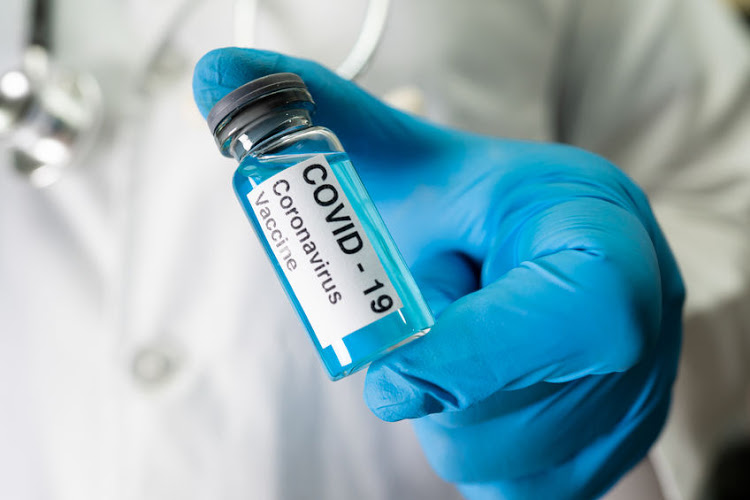
Mar 16, 2021 | News
The participation of private actors including pharmaceutical companies in the development and delivery of COVID-19 vaccines has important implications for human rights, in particular the rights to life and to health, that have not been properly considered, a panel of experts asserted in a webinar organized by the South African Institute for Advanced Constitutional, Public, Human Rights and International Law (SAIFAC), the ICJ and the Konrad Adenauer Stiftung (KAS) on March 11.
Taking place exactly one year after the World Health Organization declared COVID-19 a global pandemic, the webinar, entitled “What are the obligations of States and corporations to ensure access to a COVID-19 vaccine?”, brought together Dr Sharifah Sekalala from the University of Warwick, Fatima Hassan, the founder and head of the Health Justice Initiative, and Prof. David Bilchitz, the director of SAIFAC.
As the United Nations Committee on Economic, Social and Cultural Rights (CESCR) has recently reaffirmed, vaccine access raises human rights issues relating to both the obligations of States and the responsibilities of businesses.
Carlos Lopez, ICJ’s Senior Legal Adviser stressed:
“It is clear that States have a duty to protect the right to health which entails an obligation to appropriately regulate private actors in health – including those involved in vaccine production and distribution – to retain the affordability and accessibility of COVID-19 vaccines for all. Corporate entities, for their part, have a responsibility to respect the right to health which they violate when they adopt practices which limit or inhibit non-discriminatory vaccine access to all people around the world.”
One of the main elements in the debate is the issue of people’s access to vaccines that are adequate and affordable, and how the capacity of the States to fulfil this key aspect of their international law obligations is being constrained by the operation of certain trade and intellectual property rights law, in particular the Trade-Related Intellectual Property Rights (TRIPS) Agreement of the WTO.
Dr Sekalala, pointed to a fundamental underlying issue relating to the predominant rationale of States and companies:
“One of the things that bothers me as a global health lawyer is the lack of transparency around this process and also, in some ways, the fact that States are still clinging on this research and development rationale, maintaining intellectual property rights”.
This also raises serious questions about the nature of the responsibilities that corporate entities may have to respect the right to health, as has been clarified in General Comment 24 of the CESCR and the UN Guiding Principles on Business and Human Rights.
“There is a moral dimension to the question about vaccine access: what should society expect of the corporations? And there is also a legal one: what does the law require? Fundamental rights are essentially urgent moral claims that demand legal institutionalization. Fundamental rights recognized in international law, in the South African Constitution and many other constitutions around the world require, in my view, that corporations have positive obligations but if such positive obligations are not recognized in legal systems, domestically or internationally, the claim is they ought to be”, said Professor Bilchitz.
Although vaccine access may implicate human rights responsibilities of a range of private business entities, such considerations are especially pronounced with regard to pharmaceutical companies given the direct impact of their business operations on vaccine access. Vaccine access raises clear issues about the protection of human rights and the rule of law both internationally and in particular domestic jurisdictions like South Africa.
“Pharmaceutical companies and some wealthier governments that have actually co-funded a lot of the accelerated vaccine research are basically using their own law… right now they are acting as if they are God, they are determining access for the entire world, including the Global South. The Constitution has been thrown out of the window, particularly in the domestic context of South Africa”, said Hassan.
Watch the webinar here.
A powerpoint for Dr Sekalala’s presentation is available here.
A powerpoint for Professor Bilchitz’s presentation is available here.
A powerpoint for Fatima Hassan’s presentation is available here.
CONTACT:
Timothy Fish Hodgson, Legal Adviser on Social, Economic and Cultural Rights, e: timothy.hodgson@icj.org
Tanveer Rashid Jeewa, Communications and Legal Officer, e: tanveer.jeewa@icj.org
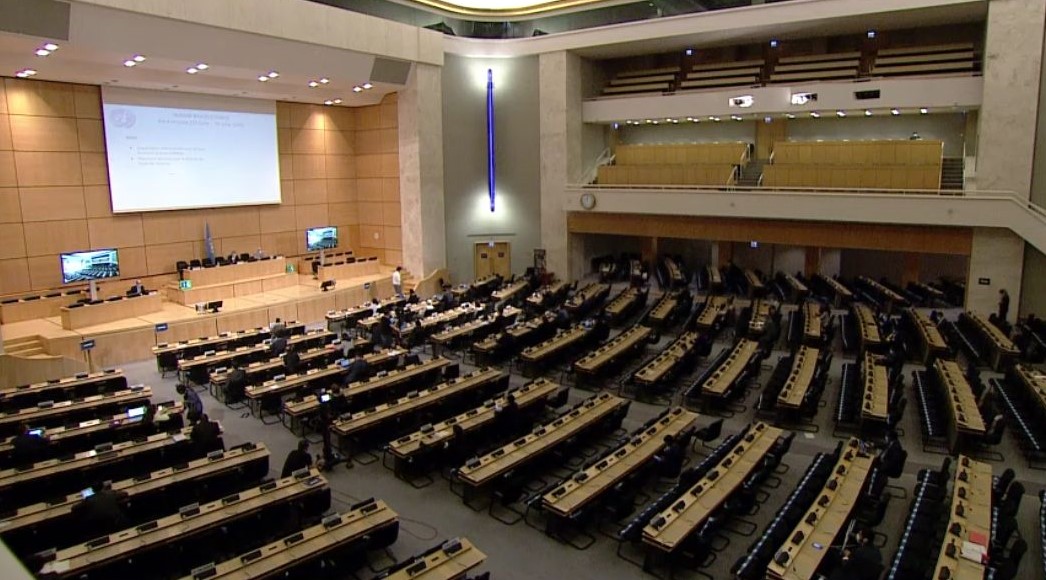
Mar 11, 2021 | Advocacy, Non-legal submissions
Today, the ICJ called on the Office of the High Commissioner for Human Rights to guarantee transparency and participation in its activities in Venezuela in an oral statement delivered during the interactive dialogue on the oral update by the UN’s High Commissioner of Human Rights on Venezuela.
The statement reads as follows:
“Madame President,
The International Commission of Jurists (ICJ) welcomes the High Commissioner’s oral update on the situation of human rights in Venezuela, particularly regarding the cooperation between her office and the Venezuelan authorities.
The ICJ underscores the importance of transparency on the activities conducted under the Memorandum of Understanding (MoU) signed by both parties. Publication of the MoU to inform the public and ensure the optimal engagement of stakeholders is critical to its success.
The ICJ stresses that in addition to civil and political rights, economic, social, cultural rights continue to be violated in Venezuela, a situation aggravated by the COVID-19 pandemic. As of January 2021, at least 37 health workers have died due to the lack of protective equipment and basic supplies in healthcare centers.
In light of recent announcements by Venezuelan authorities, political considerations appear to be a driving factor in the COVID-19 vaccine prioritization plan, instead of objective and public health criteria, which could lead to discrimination and a denial of equal protection of law.
The ICJ recommends that the High Commissioner monitor and report on the status of the Venezuelan authorities’ compliance with her previous recommendations, and on her broader engagement with local civil society with a view to protecting human rights.
Thank you.”
Contact:
Massimo Frigo, ICJ UN Representative, e: massimo.frigo(a)icj.org, t: +41797499949
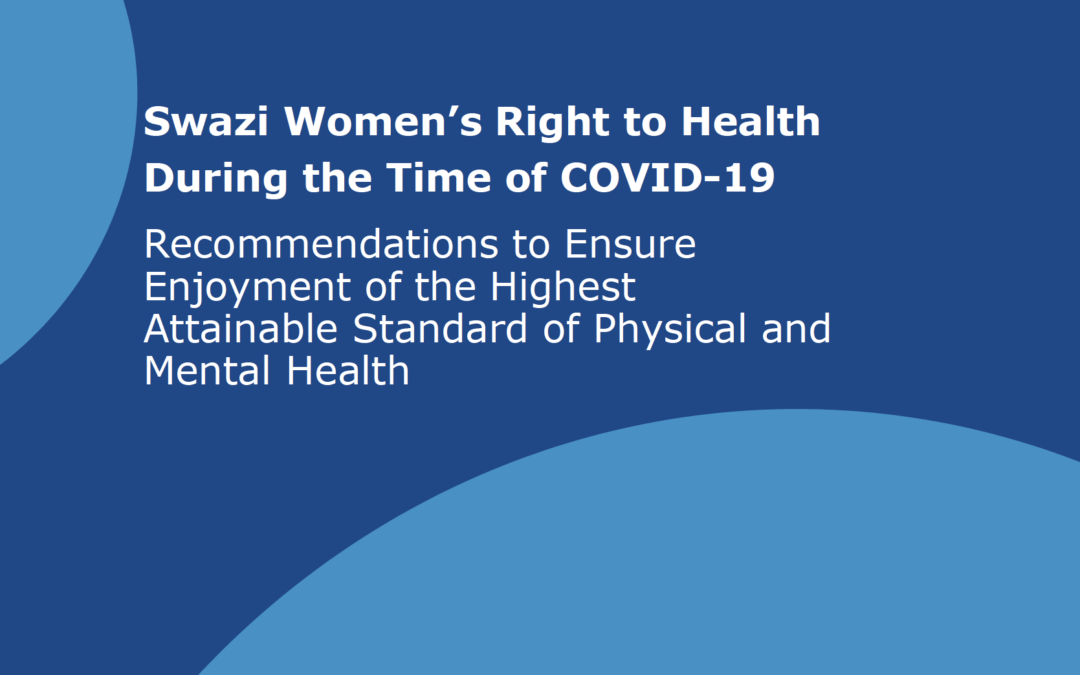
Mar 8, 2021 | Advocacy, Analysis briefs
On International Women’s Day 2021, the ICJ publishes a paper considering the ways in which women in Eswatini face systematic discrimination in laws and practices, in violation of the country’s obligations under international human rights law with respect to women and girls’ right to health, including sexual and reproductive health.
The publication concludes with recommendations to the Eswatini authorities on how they may enhance women and girls’ ability to fully and equally benefit from and enjoy their right to health and their other human rights without discrimination.
The paper is entitled “Swazi Women’s right to health during the time of COVID-19: Recommendations to ensure enjoyment of the highest attainable standard of physical and mental health”. It was launched through a conversation with Zanele Thabede-Vilakati, the National Director of Women and Law in Southern Africa (WLSA) Research and Educational Trust in Eswatini. In the discussion, Thabede-Vilakati outlined the obstacles faced by Swazi women before and after the COVID-19 pandemic. Talking about the ICJ publication, she added:
“The ICJ report on Swazi Women’s Right to Health during COVID-19 is an in-depth observation of all the issues which women face in their daily lives in getting access to their basic right to health. The recommendations made by the ICJ can only enrich Eswatini authorities’ approach to protecting and empowering women and I hope that they take these recommendations on.”
The report considers Eswatini’s obligations not only under national law, including under the Swazi Constitution, but also under international law in an effort to assess whether Eswatini is complying with its human rights obligations.
The report reflects on the obstacles that Swazi women have faced before and during the COVID-19 pandemic in exercising their right to health. Some of the key human rights concerns include: lack of access to sexual and reproductive healthcare; the high prevalence of HIV/AIDS among Swazi women; obstacles in accessing sexual and gender-based violence-related healthcare services; and inadequate access to shelters and housing for women in Eswatini.
Based on the publication’s assessment, recommendations are addressed to Eswatini authorities for specific measures to be taken to protect women, as well as meet Eswatini’s obligations under national, regional and international law.
Speaking about the report, ICJ’s Africa Regional Programme Director, Kaajal Ramjathan-Keogh stated,
“The right to health is a crucial right to everyone, but in a country such as Eswatini – one of the most severely HIV affected countries in the world – women’s right to health is a priority as women remain disproportionally affected by HIV. We hope that this report and its recommendations cause the relevant actors to reflect on ways in which they can assist Swazi women, especially in light of the increased obstacles that women have faced in accessing their right to health due to the COVID-19 pandemic.”
In order to realize the right to health of women and girls in Eswatini, the report recommends that the Eswatini authorities take certain measures, including the following:
- Ensure access to family planning health services for all women and LGBT persons;
- Parliament must enact domestic legislation, which clarifies the circumstances under which abortion is legally available to women;
- Ensure all health facilities, throughout the country, are equipped with all essential medicines;
- Guarantee access to information and education on sex, sexuality, HIV, sexual and reproductive rights especially for adolescents and youth;
- Prioritise the provision of pre- and post-natal healthcare services in a manner that does not risk COVID-19 transmission; and
- Repeal discriminatory laws, policies and practices in the area of sexual and reproductive health, including restrictive abortion laws and laws and policies that discriminate against LGBT persons;
- Adopt legislation providing for legal aid to enable victims of gender-based violence to be better able to access justice and effective remedies for SGBV, including through courts;
- Ensure comprehensive services for survivors of sexual and gender-based violence are available during the pandemic;
- Increase access to healthcare services for victims and survivors of gender-based violence, including medical and psychosocial support and ensure adequate rape kits in all health centres; and
- Increase access to shelters and alternative accommodation for victims of gender based and domestic violence in Eswatini, including accommodation or shelters that should be made available in all parts of the country.
Background
Eswatini is a monarchy. Under its Constitution, customary law, except insofar as it is inconsistent with the former, is recognized as part of Eswatini’s legal system in addition to common law and statutory law. Eswatini is party to several binding international, including regional, human rights treaties guaranteeing the right to health, including sexual and reproductive health, for everyone, including women and girls. Irrespective of the protections afforded in Eswatini’s domestic legal system, as a matter of international human rights law, Eswatini is bound to fulfil its obligations to realize the right to health, including sexual and reproductive health.
Contact
Nokukhanya (Khanyo) Farisè, Legal Adviser (Africa Regional Programme), e: nokukhanya.farise(a)icj.org
Tanveer Jeewa, Communications Officer (Africa Regional Programme), e: tanveer.jeewa(a)icj.org
Download
Eswatini-Swazi Women Right to Health during COVID19-Report-2021-ENG
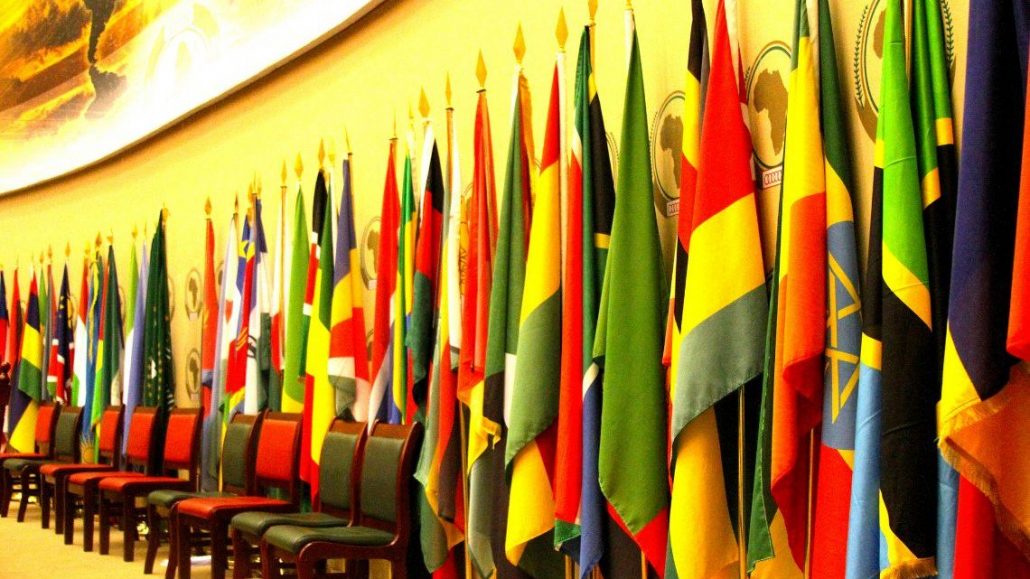
Feb 19, 2021 | Advocacy, News, Open letters
In a letter of 17 February, the ICJ and ZimRights called on the Chairperson of the African’s Commission on Human and Peoples’ Rights Working Group on Economic, Social and Cultural Rights to address Zimbabwe’s failure to meet its obligations to protect the rights of life and health of its population in respect of its COVID-19 vaccine policies.
Zimbabwe had failed to produce, publish and widely disseminate a comprehensive plan on vaccine acquisition and distribution. These are also necessary measures to secure the life and health of those living in neighbouring countries of Zimbabwe and therefore of broader concern within the Southern African Development Community in particular.
The ICJ and ZimRights called for an intervention of the Working Group and the wider African Commission with a view to ensure that vital information is made available by the Government of Zimbabwe about its national plan for COVID-19 vaccine procurement, distribution and roll-out including any resources it has set aside for these efforts.
To read the full letter, click
here.









